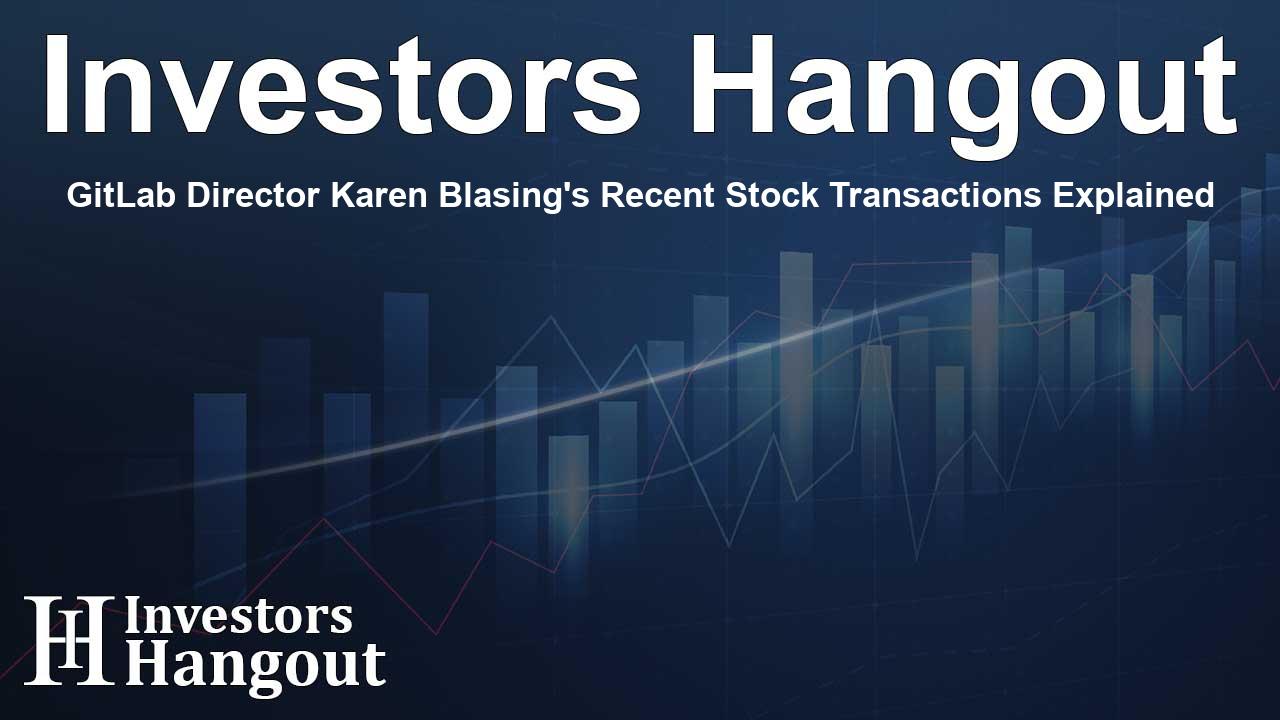GitLab Director Karen Blasing's Recent Stock Transactions Explained

Understanding GitLab's Recent Insider Trading
GitLab Inc. (NASDAQ:GTLB) has recently caught the attention of market watchers following the stock transactions executed by its director, Karen Blasing. A recent filing with the U.S. Securities and Exchange Commission unveiled that Blasing sold a substantial portion of her stock holdings, totaling over $173,000.
Details of the Stock Sale
The filing disclosed that this transaction encompassed two distinct sales of Class A Common Stock. In the first sale, Blasing divested 2,650 shares at an average price of $53.24. The second sale comprised 600 shares at an average price of $53.85. Notably, the share prices during these transactions fluctuated between $52.71 and $54.01.
Blasing's Remaining Shares
Despite the recent stock sale, Blasing retains ownership of a significant number of shares in GitLab, amounting to 144,483. This figure includes shares of Class A Common Stock that are yet to vest, indicating her continued commitment to the company.
Compliance with Trading Regulations
The transactions were conducted under a trading plan established earlier in the year, specifically on March 26, in line with Rule 10b5-1 of the Securities Exchange Act of 1934. This rule is designed to permit company insiders to prearrange the sale of their stocks, significantly reducing the risk of insider trading allegations.
Reasons Behind the Sale
While the specific motivations behind Blasing's decision to sell her shares were not detailed in the filing, it is common for corporate executives to sell shares for various personal and financial planning reasons. These transactions are viewed as normal practice within corporate governance and transparency.
GitLab's Market Position and Financial Performance
GitLab operates within the prepackaged software sector, recognized for its innovative web-based DevOps lifecycle tool that enhances collaborative environments throughout software development phases—from inception to deployment. Given GitLab's position in a continually evolving technology landscape, investors are keeping a watchful eye on the company’s stock movements, as they can provide valuable insights into insider perspectives regarding GitLab's financial health and growth potential.
Recent Financial Highlights
In recent earnings reports, GitLab announced an impressive 31% increase in year-over-year revenue for the second quarter, reaching $183 million. Furthermore, the company's non-GAAP operating margin, which surpassed expectations, stood at 10%. This growth has been fueled by the acquisition of new customers and the expansion of existing customer accounts, particularly through the successful integration of AI features in their offerings.
Future Projections and Growth Trends
Looking ahead, GitLab forecasts its Q3 revenue to be between $187 million and $188 million, with annual revenue expectations ranging from $742 million to $744 million. The increasing capabilities in AI are driving substantial growth, with expectations for a year-over-year growth rate of about 25% to 26% in Q3 and 28% for the entire fiscal year.
Anticipated Challenges and Considerations
Despite the positive outlook, GitLab anticipates incurring roughly $14 million in expenses associated with its joint venture in China, JiHu, for the fiscal year. While the company's AI services are still in the early adoption stages, they are expected to serve as pivotal long-term growth drivers.
Analysis of GitLab's Market Sentiment
Themarket capitalization of GitLab, currently standing at $8.28 billion, illustrates its prominent role within the industry. Although GitLab has reported losses over the past year, its notable 32.42% revenue growth and a robust gross profit margin of 89.29% signify effective management and operational efficiency.
Investor Insights and Analysts' Expectations
Additionally, GitLab maintains a solid liquidity profile, possessing more cash than debt—a factor that provides financial flexibility in navigating market changes or exploring investment opportunities. With numerous analysts upping their earnings projections, there's a prevailing sentiment suggesting confidence in the company’s potential.
Conclusion
For investors analyzing GitLab's performance and growth narratives, the recent stock transaction by Karen Blasing serves as a reference point to understand insider activities within the company. As GitLab continues to evolve within the prepackaged software landscape, its financial metrics and strategic vision will undoubtedly shape investor sentiments moving forward.
Frequently Asked Questions
What prompted Karen Blasing to sell her GitLab stock?
The specific reasons for Blasing's stock sale weren't disclosed, but such transactions often relate to personal financial needs or planning.
How many shares does Karen Blasing own after the sale?
After the sale, Blasing retains ownership of 144,483 shares, including unvested shares.
What is GitLab's expected revenue for the upcoming quarter?
GitLab forecasts its Q3 revenue to be between $187 million and $188 million.
How much did GitLab's revenue grow recently?
GitLab reported a 31% year-over-year revenue increase for its second quarter.
What is GitLab's market capitalization?
As of now, GitLab's market capitalization is approximately $8.28 billion.
About Investors Hangout
Investors Hangout is a leading online stock forum for financial discussion and learning, offering a wide range of free tools and resources. It draws in traders of all levels, who exchange market knowledge, investigate trading tactics, and keep an eye on industry developments in real time. Featuring financial articles, stock message boards, quotes, charts, company profiles, and live news updates. Through cooperative learning and a wealth of informational resources, it helps users from novices creating their first portfolios to experts honing their techniques. Join Investors Hangout today: https://investorshangout.com/
Disclaimer: The content of this article is solely for general informational purposes only; it does not represent legal, financial, or investment advice. Investors Hangout does not offer financial advice; the author is not a licensed financial advisor. Consult a qualified advisor before making any financial or investment decisions based on this article. The author's interpretation of publicly available data shapes the opinions presented here; as a result, they should not be taken as advice to purchase, sell, or hold any securities mentioned or any other investments. The author does not guarantee the accuracy, completeness, or timeliness of any material, providing it "as is." Information and market conditions may change; past performance is not indicative of future outcomes. If any of the material offered here is inaccurate, please contact us for corrections.